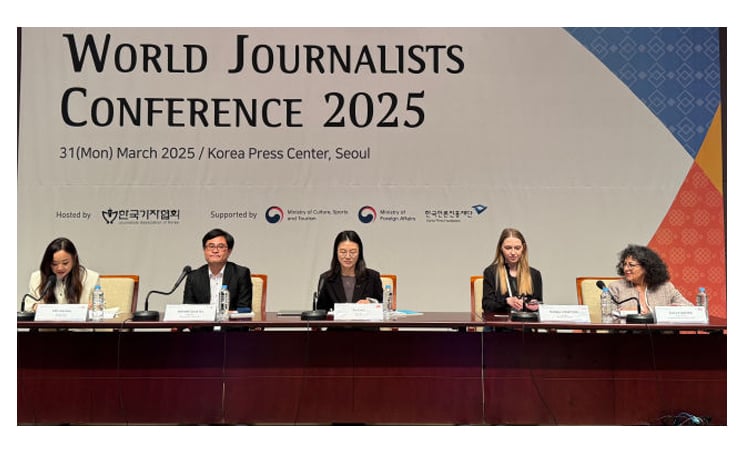News Flash

DHAKA, April 12, 23025 (BSS) - Media professionals from around the world have emphasized the urgent need for a globally coordinated policy on the use of Artificial Intelligence (AI) in journalism to uphold ethical standards and preserve public trust in news reporting.
The call came during the World Journalists Conference 2025, held in Seoul, South Korea recently that brought together 62 journalists from 53 countries.
The annual event, hosted by the Journalists Association of Korea, was organized to deliberate on the evolving challenges and opportunities facing global media, with a special focus on AI and climate change.
Diana Fuentes, Executive Director of Investigative Reporters and Editors (IRE) in the United States, said that while AI offers powerful tools to enhance journalism, human oversight remains essential.
"We believe the best approach to AI is to learn to use the tools while continuing to explore the breathtaking possibilities - and keeping ethics top of mind. Humans need to be involved all along the way," she said during a panel discussion.
Fuentes, who also teaches news reporting at Texas State University, stressed the importance of transparency in how newsrooms deploy AI technologies.
"When an investigative story is printed, posted, or broadcast, the news outlet should provide a short explanation in plain language about how AI was used," she added.
Trust, she pointed out, is hard to earn but easy to lose, and newsrooms must be transparent about AI's involvement in reporting.
Echoing similar concerns, HWANG Seok-ha, a staff writer at Korea's Busan Daily News, warned that AI's unauthorized use of news content poses a serious threat to media copyrights and financial sustainability.
"Without clear legal safeguards, there is a high risk of jeopardizing the sustainability of journalism," he said adding, "it is crucial to establish institutional frameworks that ensure fair compensation when AI trains on and utilizes news articles".
In his opening address, President of the Korea Journalists Association Park Yong-hyun emphasized the dual challenges of disinformation and AI, warning that these issues could undermine journalism's credibility and democracy worldwide.
"Journalism must adapt and lead the way in confronting these challenges while safeguarding its ethical standards," he said.
While inaugurating the conference, President of the National Assembly of South Korea Woo Won Shik, echoed these concerns, stressing the importance of a vigilant and transparent media in the fight against fake news, which he described as a significant threat to global democracy.
The growing presence of AI in newsrooms was among the central themes of the conference while participants noted that AI is being increasingly integrated into media workflows - from data analysis and automated news generation to audience engagement.
However, there was unanimous agreement that AI must complement, not replace, the human elements of journalism.
Polish journalist Natalia Szewczak, whose reporting led to significant reforms in Poland's maternity leave policy, shared her personal insights.
"AI can analyze data and summarize information," she said adding "But it cannot understand the nuances of human experiences or the importance of challenging injustice. That is where human journalists remain irreplaceable."
Speakers at the conference also underscored the importance of strong ethical standards and the need to address disinformation, particularly in an age of rapidly generated synthetic content.
Another key point of discussion was the obligation of technology companies to compensate media organizations for the use of journalistic content in training AI models.
Participants called for comprehensive global policies to ensure fair practices in this area.
Beyond AI, the conference also explored the media's critical role in covering climate change - another pressing global issue that demands sustained, accurate, and impactful reporting.
At the end of the conference, delegates issued a joint appeal for greater unity among media professionals across borders to tackle shared challenges and protect the integrity of journalism.
Participants agreed that as the media industry navigates the transformative wave of AI, the values of transparency, accountability, and ethical journalism must remain at its core.